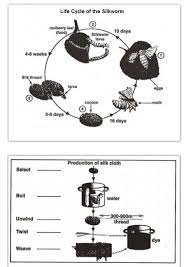» You should spend about 20 minutes on this task.
The diagrams below show the life cycle of the silkworm and the stages in the production of silk cloth.
Summarise the information by selecting and reporting the main features, and make comparisons where relevant.
» Write at least 150 words.

Sample Answer 1
The given pictorial show the life cycle of the silkworm and also shows the processes of silk cloth productions.
The life cycle of a silkworm begins from the eggs laid by the mother worm and from these eggs the silkworm larvae are generated after 10 days. The silkworm larva usually eats leaves like mulberry leaves and completes the second stage of the life cycle in 4-6 weeks. In their third stage, they create silk thread shells and remain there for another 3 to 8 days and then create an oval cocoon. The cocoon stage lasts for around 16 days and they become moth in the final stage. With time the moths become grown-up and recycle the processes again.
The second picture describes the processes of the silk cloth production which have more than 5 stages. In the initial stage, the silk thread shells of the silkworm are selected and then boiled in the next stage. After boiling in water the threads are unwinded and they are usually 300 to 900 meter long. Then these are twisted and dyed and finally, those are weaved to silks. The twisting, dying, weaving and then dying again the process is done more than once as per necessary to produce fine quality silks.
Sample Answer 2
The two given pictures describe the life cycle of silkworm and also illustrate the procedure of silk cloth production.
As is presented in the first picture life cycle of silkworm begins with eggs laid by mother worm. Silkworm eggs transform into the shape of silkworm larva after around 10 days. Then the second process starts, and in this stage larva usually, eat leaves like mulberry leaves in order to grow up.
Food process lasts 4 to 6 weeks. Larva generates silk threads shells at the end of the second stage. The third stage begins when silk thread shells create cocoons, this process usually lasts for 3 to 8 days. In the final stage, cocoons transform into moths after 16 days. And moths grow up and recycle whole procedure step by step.
As is observed from the second picture, which describes the producing of silk cloth from silkworm, total stages of silk cloth production are five. Initially, in the first stage, silk thread shells are selected and boiled into hot water. Shells are unwinded properly and unwinded shells are exactly 300 to 900m long. Then threads are twisted and dyed in dyers. And finally, those silks are weaved and again dyed.
The process of twist and dry, weave and dry possibly repeated if it is necessary to produce high-quality silk cloth.
[ Written by – Faisal Ali ]
Sample Answer 3
The diagrams illustrate the life cycle process of the silkworm as well as various steps in making of silk cloth.
Overall, the life cycle of silkworm has four major stages which begin with eggs and end with cocoon. Similarly, there are four main steps in the production of silk cloth commencing with boiling into the water and ending with dying process.
Initially, the life cycle of silkworms starts with eggs which are laid by bees on the mulberry leaves. After this stage of the cycle, it becomes silkworm larva on mulberry leaves. It is then developed into silk thread within 4 to 6 weeks. After the last main stage of the life cycle, it is transformed into cocoons, which is necessary to make a silk cloth.
In the production of silk cloths, selected cocoons are boiled into the water. Unwinding is in the second process in which 300 to 900 mm threads are produced. Eventually, it is then twisted which is helpful for making waves. Finally, the wave is ready for dye process in any colour for the final production of silk clothes.
[ Written by – Tayyab Shahbaz ]
